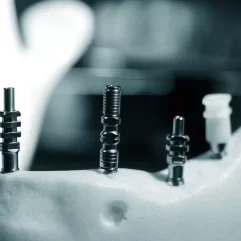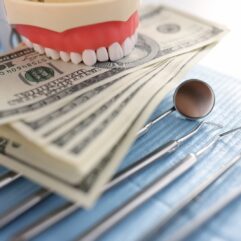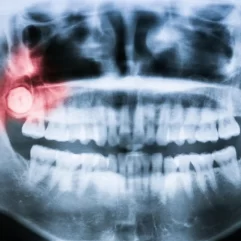Of all the dental health concerns the majority of people struggle with at some point in their lives, wisdom teeth may very well be the most common one. Although not everyone develops wisdom teeth, the experience of growing wisdom teeth can be a very painful experience for those who do.
If you’ve been searching “wisdom teeth removal near me” on the internet, it could mean one of two things: You have either decided to get your wisdom tooth removed as soon as you’ve felt slight discomfort, or you’ve waited until the until the pain has become unmanageable.
So, what is the right time for wisdom teeth extraction and what happens if you don’t do it on time? Continue reading as we dive deep into the world of wisdom tooth removal and the potential health risks of delaying it.
What Are Wisdom Teeth?
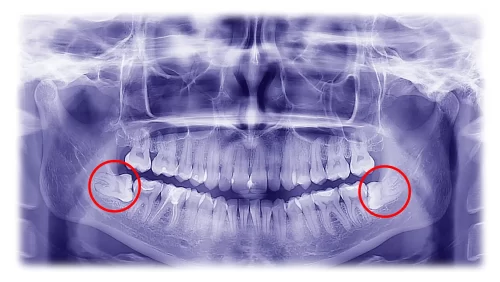
Also known as third molars, wisdom teeth are the last set of molars that are located at the very back of your mouth and are typically expected to grow out during the late teen and early years of adulthood. Even though the vast majority of people find the need to have their wisdom teeth extracted at one point or another, studies show that roughly 5% to 37% of individuals never grow them in the first place because they have congenitally missing wisdom teeth.
The decrease in the formation of wisdom teeth in the modern humans has to do with evolution: Unlike our ancestors, our diets no longer consist of hard meats, nuts, and raw plants. Modern utensils and food preparation techniques have led to gradual decrease in the size of our jaws, and subsequently, the need for wisdom teeth.
So, if you or someone you know never experience wisdom tooth discomfort or have to run to the dentist for emergency wisdom tooth removal, there’s no reason to worry. Contrary to the age-old myth, the presence of wisdom teeth, or lack thereof, doesn’t actually have anything to do with the individual’s wisdom or intellect!
Learn more about congenitally missing wisdom teeth here.
Signs That You Have Wisdom Teeth
Here are some of the initial telltale signs that you may be growing wisdom teeth according to WebMD:
- White spots behind your molars
- Facial and jaw pain or tenderness
- Swelling at the farthest corners of the back of your mouth
- Red gums
If you find yourself experience some or all of these symptoms, consult a dentist immediately. Avoiding or delaying wisdom tooth extraction can lead to worsened pain and oral health issues.
Potential Complications of Growing Wisdom Teeth
Impacted Wisdom Teeth
Impaction of wisdom teeth is one of the most common risks of delaying wisdom tooth removal. In short, it occurs when a growing wisdom tooth is not able to fully emerge out of the gums.
There are four types of wisdom teeth impactions:
- Vertical impaction: Is when the wisdom tooth is angled towards the roof of your mouth but stuck underneath the gums.
- Horizontal impaction: Is when the wisdom tooth is lying on its side and trapped in the gums, resulting in severe pain.
- Distal impaction: Is when the wisdom tooth is angled towards the back of your mouth (rare).
- Mesial impaction: Is when the wisdom tooth is angled towards the front of your mouth (common).
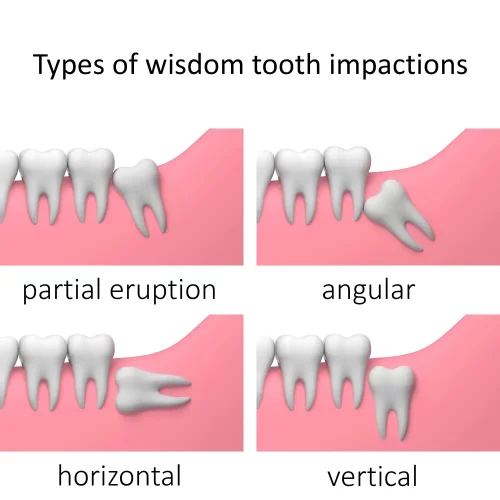
Impacted wisdom teeth can potentially lead to a number of oral health complications such as infection, severe pain, and damage to the jawbone and adjacent teeth.
These are some signs of wisdom teeth infection:
- Facial swelling
- Sensitivity or pain
- Difficulty talking, chewing, or opening your mouth
- Red and/or inflamed gums surrounding the wisdom tooth
- Bad breath
- Fever
- Pus coming out of the gums
Please consult a dentist immediately if you are experiencing any of these symptoms.
Misalignment and Crowding
Wisdom teeth, which are basically third molars, take up a lot of the limited space occupied by the rest of your teeth. This leads to overcrowding, which in turn disturbs the alignment of the surrounding teeth.
Overcrowding can lead to discomfort in the jaw and trouble chewing.
Consequences of Delaying or Avoiding a Wisdom Teeth Extraction
- Wisdom Tooth Cavity: Growing wisdom teeth cause the gums to swell, creating spaces where bacteria form and cause decay
- Jaw Damage and Cyst Formation: Not removing wisdom teeth leads to the formation of cysts, causing painful nerve damage and deforming the jawbone structure
- Severe Discomfort and Pain: Persistent pain, discomfort, tenderness, and soreness negatively impact your quality of life and daily routine
Wisdom Teeth Removal Procedure
- The procedure begins with the administration of general anesthesia to desensitize the patient to any pain.
- The oral surgeon then exposes the jawbone and tooth by cutting through the gum tissue.
- A section of the jawbone is removed to expose the root of the wisdom tooth underneath.
- Depending on the position of the tooth, the oral surgeon may cut and divide it into sections in order to remove it piece by piece.
- The site is thoroughly cleaned to remove any bone or teeth fragments.
- The wound is closed with stitches and a gauze is placed to control the bleeding.
Dos and Don’ts After Wisdom Tooth Extraction
It is essential to take care of your oral health practices after wisdom tooth removal. Here are some important considerations:
Hygiene
Do not brush your teeth for the first 24 hours after the surgery. Only use mouthwash or rinse your mouth gently for the first 24 hours following the surgery. After 24 hours, you can begin brushing your teeth but avoid brushing the surgical site.
Pain Management
The worst day of pain after wisdom tooth extraction typically starts a day or two after the surgery. In most cases, over-the-counter pain relief medication like ibuprofen does the trick. However, if your surgery involved bone removal, you may be given prescription medication for the pain. Here’s a tip: Gently hold an icepack to your jaw for pain relief!
What Can You Eat After Wisdom Teeth Removal?
Knowing the right foods to eat after wisdom teeth extraction is very important as it takes your jaw and gums some time to heal. For those of you looking up “what can I eat after wisdom teeth removal,” on the Internet, consider these tips:
- Eat soft foods like apple sauce and yoghurt for the first 24 hours after surgery
- Use your best judgement and gradually transition to semi-soft foods
- Avoid spicy, chewy, and hard foods to allow the jawbone and wound to heal
Here’s a comprehensive list of foods you can safely eat after wisdom teeth extraction by Healthline.
Affordable Wisdom Teeth Removal with Beyond Borders Dental Clinics
When it comes to dental care, quality should be the main concern. Searching for “wisdom tooth removal cost” and “wisdom tooth removal near me” on Google will only provide you with part of the answer, as your priority should be to find the best dental care available without spending excessively.
Beyond Borders Dental has carefully curated and vetted dental clinics in six well-known locations throughout Mexico. We prioritize quality over quantity, ensuring our referred clients receive top-level services and personalized care throughout their dental journey. You can be confident that you will receive top-quality dental care at a significantly lower cost than wisdom tooth extraction in the U.S.
If you would like to learn more about wisdom teeth removal and affordable dental care with Beyond Borders Dental, please Contact Us or Request a Quote to send us your dental inquiry, and we’ll get back to you.



